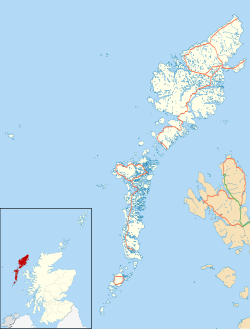Callanish II
Cnoc Ceann a' Gharaidh | |
 Callanish II seen from the west | |
| Location | Lewis |
|---|---|
| Coordinates | 58°11′40″N 6°43′44″W / 58.19444°N 6.72888°W |
| Type | Stone circle |
| History | |
| Periods | Neolithic, Bronze Age |
The Callanish II stone circle (Scottish Gaelic: Cnoc Ceann a' Gharaidh[1]) is one of many megalithic structures around the better-known (and larger) Calanais I on the west coast of the Isle of Lewis, in the Outer Hebrides, Scotland.
Description
[edit]Callanish II is situated on a ridge just 90 metres from the waters of Loch Roag.[2] It is just a few hundred metres from the Callanish III stone circle. See also Callanish IV, Callanish VIII and Callanish X for other minor sites.
The stone circle consists of seven thin standing stones arranged in the shape of an ellipse measuring 21.6 by 18.9 metres.[2] Five of the stones are standing and two have fallen.[1] The stones vary from 2 to 3.3 metres in height.[1] A slab, 1.4 metres long, lies in front of the western stone, pointing towards the centre of the circle.[1] The stone circle surrounds a cairn with a diameter of 8.5 metres.[1]
When 3 feet (1 metre) of peat was removed from the site in 1848, four holes were noticed, three grouped in an arc at the northwest, a fourth at the south-west.[2] Wood charcoal found in them suggests that they formed an earlier timber circle about 10 metres in diameter.[2]
References
[edit]- ^ a b c d e "Site Record for Lewis, Callanish, 'Tursachan' Callanish Ii; Cnoc Ceann A' Gharraidh; Cnoc Ceann; Ceann A'Gharaodh; Calanais". RCAHMS. Retrieved 25 September 2014.
- ^ a b c d Burl, Aubrey (2005). A Guide to the Stone Circles of Britain, Ireland and Brittany. Yale University Press. p. 151. ISBN 0300114060.
External links
[edit]58°11′40″N 6°43′44″W / 58.19444°N 6.72889°W


